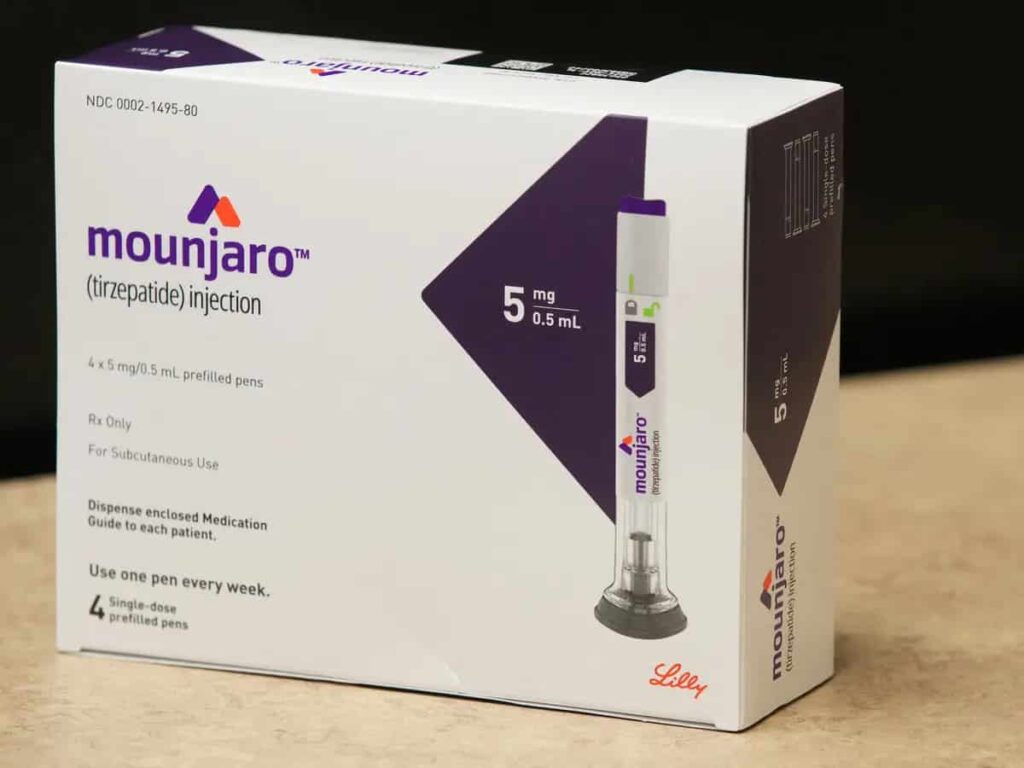Mounjaro Side Effects
Mounjaro is an injectable prescription medication used along with exercises and diet to improve blood sugar (glucose) in people with type 2 diabetes.
Warnings
It is not known at this time whether Mounjaro can be used in people with pancreatitis.
This medicine should not be used in people with type 1 diabetes.
It is not known whether the drug is safe in children under 18 years of age.
If you are an individual under the age of 18, safer medications may be prescribed with a doctor’s advice.
You may have a higher risk of getting low blood sugar if you use the medicine with another medicine that can cause low blood sugar, such as insulin or a sulfonylurea.
Signs and symptoms of low blood sugar are listed below:
- Dizziness or lightheadedness
- Sweating
- Confusion or drowsiness
- Headache
- Blurred vision
- Slurred speech
- Tremors
- Fast heartbeat
- Anxiety
- Irritability or mood changes
- Hunger
- Feeling of weakness and tension
It has been observed that some people using the drug experience gallbladder problems.
If you notice any of the following health problems, tell your healthcare provider immediately:
- Pain in the upper part of your stomach (abdomen)
- Fire
- yellowing of the skin or eyes (jaundice)
- Clay colored stools
Your doctor may vary the doses when prescribing this medication.
If you are going to give this injection once a week, you will most likely start with 2.5 mg.
After 4 weeks your doctor will ask you to switch to 5 mg.
To go above 5 mg, your doctor needs to monitor you carefully. In some cases, it may be necessary to exceed the 5 mg limit and this is a decision only your doctor will make.
The medicine should be used once a week.
It is important to contact your doctor with any questions you may have.
The medication may cause nausea, diarrhea, and vomiting (dehydration) in people with kidney problems.
If dehydration occurs, it can cause kidney problems to worsen.
It is important to drink fluids to minimize the possibility of dehydration.
The medicine can cause stomach problems in some cases.
If you have a severe and persistent stomach problem, please inform your doctor.
Tell your healthcare provider if you have severe or persistent stomach problems.
Avoid fatty foods.
You can try eating soft foods such as crackers, toast, or rice.

Mounjaro Side Effects
Mounjaro may cause side effects, and these side effects do not occur in everyone.
If you experience any of the undesirable effects listed below while using this injection, stop using this medicine and contact your doctor immediately:
- Nausea
- Diarrhea
- decreased appetite
- Vomiting
- Constipation
- Indigestion
- Stomach ache
Studies show that side effects such as vomiting, diarrhea and nausea occur after increasing the doses, but these effects decrease over time.
Serious side effects include:
- Inflammation of the pancreas (pancreatitis)
- Severe pain in your stomach area (abdomen) that will not go away with or without vomiting (You can feel the pain from your abdomen to your back).
General Recommendations And Tips For Diabetics
You should take the precautions listed below by discussing them with your doctor!
- It is important to get support from a dietitian. Especially if your blood sugar balance and weight are not on target, it is recommended that you stay within the recommended calorie limit.
- You do not need special diabetic products or special meals.
- You should eat from every food group every day.
- Choose complex carbohydrates and increase fiber intake.
- Eat more non-starchy vegetables (broccoli, spinach), fruits and legumes.
- Strawberries are a good fruit option that is low in calories and rich in fiber and water.
- Choose the least processed grains.
- Oats prevent blood sugar from rising rapidly, regulate blood sugar and help lose weight.
- Avoid potatoes and processed grains (white bread, white pasta, etc.).
- Use oil, sugar and salt as little as possible.
- Do not consume more than one teaspoon (2300 mg sodium) (even in the absence of hypertension). Sodium (salt) plays a role in glucose reabsorption in the kidneys.
- Choose healthy meat (fish, lean red meat, chicken).
- Choose healthy fats. Olive oil, nuts (almonds, walnuts, etc.). Do not consume trans fats found in ready-made, packaged foods.
- Since the satiety center in the brain will be stimulated after a certain period of time following the first food intake, the slower you eat, the less calories you will consume to reach this period.
- Do not continue eating when you feel full.
- Fondness for certain foods may disappear over time and preferences may change. As your eating habits change for the better, over time, the foods you used to love will begin to seem too sweet and heavy, and your food preference will automatically shift towards healthy.
- Diabetes does not mean zero sugar levels. Dessert can be consumed in very small amounts and infrequently. In this case, carbohydrate-containing foods (bread, pasta, rice, etc.) in the same meal should be restricted. If you eat slowly and savor it, you will satisfy your sweet tooth by eating small amounts. Taking it with the meal rather than alone will prevent the sudden and excessive blood sugar rise caused by dessert, and even a small amount will be enough since you are full.
You may also like our article on blue waffle disease.
